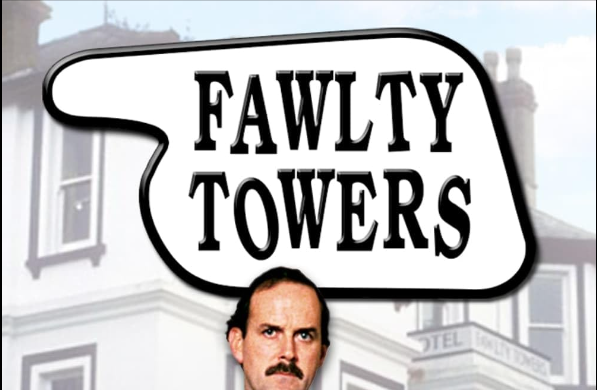In my previous review of Prime Suspect 2, I argued in favor of the British television model, which allows for a more flexible episode count and schedule.
This approach enables the creation of higher-quality content without the constraints of producing a fixed number of episodes, whether it’s 13 or 22. Fawlty Towers brilliantly capitalized on this format in its first series, with only six episodes to craft.
This brevity allowed the show to meticulously hone and refine each episode to such a degree that I found myself struggling to pinpoint any significant criticisms during the first series.
Fawlty Towers also made the most of this format by allowing a substantial hiatus between series. There was nearly a three-and-a-half-year gap between the first season finale, “The Germans,” and the second season premiere, “Communication Problems.”
Although they managed to reunite the entire cast for the second series, one can only imagine the trepidation at the time about whether they could recapture the same lightning-in-a-bottle feeling that had turned all six episodes of the show into instant classics.
The departure of director John Howard Davies, replaced by Bob Spiers, added to the concerns. Fawlty Towers had leveraged its set in a way that few sitcoms in history had, and a change in direction could have been risky.
Additionally, there was the disconcerting fact that during the hiatus between series, John Cleese and Connie Booth, who had written every episode of the first series together, had divorced after a decade of marriage.
Given that their creative collaboration was so closely tied to their personal relationship, there was a very real possibility that their professional partnership would also suffer as a consequence.
So, did the time off between episodes and all the behind-the-scenes changes affect anything? Let’s find out as we enter our coverage of the second series.
Series 2, Episode 1: “Communication Problems”
Original airdate: Feb. 19, 1979
Summary: The arrival of Mrs. Richards, a somewhat hearing-impaired, eccentric, and irritable woman, disrupts Basil’s efforts to conceal the money he won from a racehorse, all while trying to keep it hidden from Sybil.
As I’ve emphasized numerous times in my coverage of the first series, especially in “The Germans” when marveling at the unrestrained display of his id, Fawlty Towers deserves commendation for its fearlessness in portraying its main character, Basil Fawlty, as thoroughly unlikeable.
Basil is portrayed as arrogant, rude, petulant, emotionally distant, tightly wound, and harboring more than a hint of prejudice. His sole redeeming quality is that the domain he ostensibly rules keeps him in check.
His wife holds him in contempt, his employees do just enough to avoid his constant scrutiny, and the only individuals who treat him kindly are the elderly hotel regulars who are too senile to recognize just how dreadful a person he truly is.
What makes “Communication Problems” such a captivating episode—aside from its relentless humor—is the rare occasion when we find ourselves actually rooting for Basil to achieve a small victory.
This is largely due to the fact that he’s confronted with perhaps the most disagreeable guest in the annals of Fawlty Towers, the formidable Mrs. Alice Richards (portrayed by the legendary British television and stage actress Joan Sanderson).
Similar to Mr. Hutchinson from “The Hotel Inspectors,” Mrs. Richards is another guest who believes that the hotel staff should drop everything to cater to her every whim. She imperiously interrupts Polly while she’s assisting another guest.
However, the major problem is that Mrs. Richards is nearly deaf and adamantly refuses to switch on her hearing aid, claiming it “drains the batteries.”
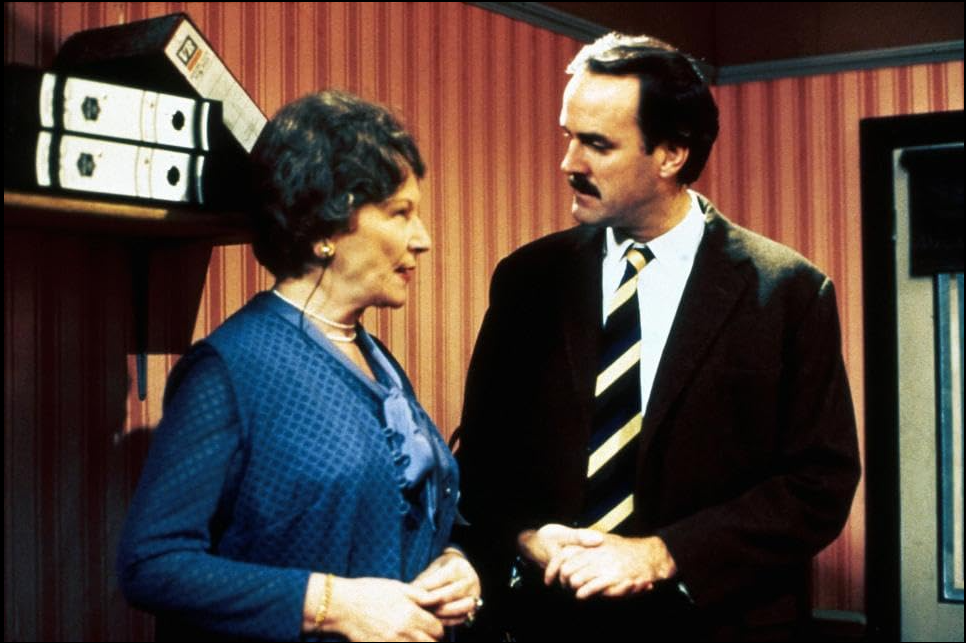
Consequently, she misses virtually everything said to her and blames the staff for her communication difficulties.
This situation becomes a source of immediate comedic delight when Polly playfully directs her to converse with Manuel, leading Mrs. Richards to believe that the manager is a certain C.K. Watt from Barcelona.
In many instances in Fawlty Towers, the humor derives from Basil’s misinterpretation of entirely innocent situations or from his own innate impatience and exacting standards, which consistently prevent him from emerging victorious.
However, in this particular scenario, it’s challenging not to side with him, as Mrs. Richards discovers flaws in every single detail of her hotel room: the bath is too small, the window lacks a sea view*, and the radio appears to be malfunctioning.
She embodies every complaint and slight that Basil has endured over his 15 years of hotel management. You can practically visualize the steam coming from John Cleese’s ears as he snippily extols the virtues of the hotel.
Later, downstairs, he attempts to communicate with her in writing, although even this endeavor fails when she realizes she’s misplaced her glasses, which were resting atop her head.
*The issue with the window view seems to be due to the fact that the view appears to have been freshly painted onto the window.
However, what’s remarkable is that even as Mrs. Richards pushes Basil to louder and more furious extremes, it never quite makes him appear in the wrong. This is a testament to Sanderson’s poise, akin to that of a Dowager Countess in terms of self-assuredness.
Typically, guests are disconcerted or upset by Basil’s unconventional approach to running the hotel, but Mrs. Richards remains unruffled by his excuses and eccentricities.
Instead, she counters his rudeness with even more rudeness, resulting in a heated shouting match: “If you knew anything at all about running a hotel, this wouldn’t happen! What do you say to that?!” This marks the first instance in the entire series where Basil can think quickly on his feet, and it’s a brilliantly executed moment of comeuppance.
Initially, he pretends to speak, leading her to believe that her hearing aid has stopped working. Then, once she turns it up, he attempts to conclude the episode by shouting into it at maximum volume.
Basil finds amusement at Mrs. Richards’ expense, providing a much-needed distraction because he’s dealing with another problem, which strangely enough stems from a rare stroke of good luck.
Acting on a tip from one of the hotel’s regular patrons (Basil humorously muses, “A satisfied customer, we should have him stuffed”), he enlists Manuel to place a modest bet on a horse in defiance of Sybil’s gambling prohibition.
The sharp and witty banter between Basil and Sybil earlier in the episode demonstrates that despite their divorce, Booth and Cleese could still collaborate effectively in their writing.
However, there’s a palpable sense that they may have channeled some of their personal frustrations into the script.
While Basil and Sybil were never affectionate in the first series, their bickering felt somewhat routine, as it was the only way they could communicate after fifteen years of marriage.
Here, the dialogue comes across as more caustic, even spiteful, as if they blame each other for everything that’s gone wrong in their lives:
“If I find out the money was yours, you know what I’ll do Basil.”
“You’ll have to sew them back on first.”
“Sybil, do you remember, when we were first manacled together, we used to laugh quite a lot?”
“Yes, but not at the same time, Basil.”
“It’s nice to share a moment like that in a marriage, isn’t it dear? I know, I read it on the back of a matchbook.”
With Mrs. Richards causing chaos, Basil is determined not to let her jeopardize the one fortunate situation he has at the moment. He must figure out how to keep his winnings a secret and manage his co-conspirators.
In theory, he has a solid plan: he instructs Manuel to forget about placing the bet and tells Polly that she should claim the money as her own if anyone inquires.
However, the execution of his plan goes as expected, resulting in a circular conversation that may well be the best scene John Cleese and Andrew Sachs share throughout the entire series.
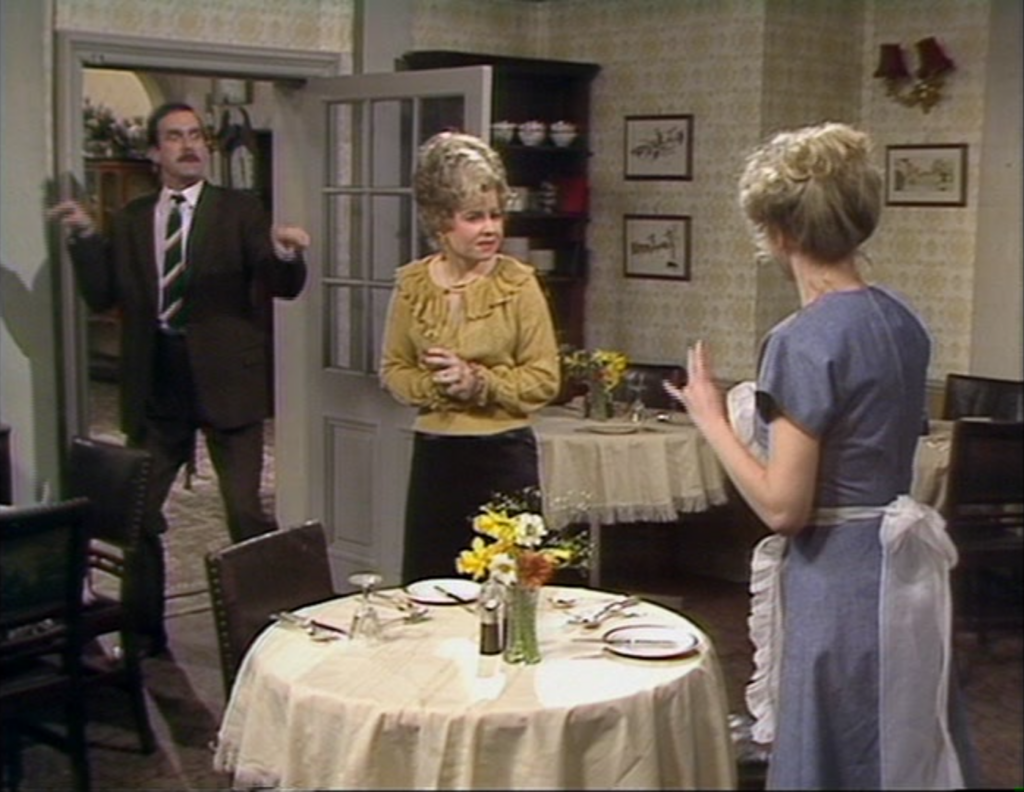
Despite the previous frustration, you might expect Polly to be easier for Basil to communicate with. However, Sybil’s suspicion is aroused, and she smoothly questions Polly about the name of the horse she bet on.
Historically, Cleese and Booth have a strong collaborative dynamic when they communicate through a third person, as seen in the ping-pong conversation about Mr. Hutchinson in “The Hotel Inspectors” and Polly’s attempt to convey Kurt’s drunkenness in “Gourmet Night.”
This particular exchange is the best one yet, as Basil attempts to silently convey the horse’s name to Polly behind Sybil’s back.
Cleese’s talent for physical comedy is consistently amusing, and his efforts to communicate through charades once again showcase his full range of motion.
The highlight is a callback to his earlier analogy of Sybil as a dragon, which Polly misinterprets as she cheerfully declares the horse’s name as “Flying Tart!”
Unfortunately for Basil, his financial predicament becomes more complex when it’s discovered that Mrs. Richards is facing a similar situation, with nearly the same amount of money missing from her room.
With Sybil on the verge of organizing a search, he urgently needs to find someone who appears above suspicion. His choice falls on Major Gowan, whom he spots at the bar.
Clearly recognizing the comedic potential of Major Gowan following the success of “The Germans,” Cleese and Booth decided to provide Ballard Berkeley with more material to work with in the second series.
Once again, Berkeley’s portrayal of the half-senile character meshes splendidly with Basil’s dogged determination to convey a point.
Basil comments on Gowan’s bright tie, asking if it’s suitable for a memorial service, to which Gowan responds with dry humor: “Well, I didn’t like the fellow.” Gowan decides to hold onto the money for the time being.
This scene concludes with a brilliant piece of physical comedy as Basil deftly tosses an ice cube into the air and catches it perfectly with a glass, downing the entire drink in one gulp.
Basil attempts to recover the money the following day, but unfortunately, he does so at a moment when Mrs. Richards happens to have her hearing aid switched on.
This results in a delightful eruption of Fawlty Towers-style chaos, where all the elements introduced earlier in the episode come to a head in a crescendo of confusion. Basil desperately tries to get Manuel and Major Gowan to retract the stories he had drilled into their heads.
However, Major Gowan claims to have forgotten everything from the previous day, even the remembrance service, to which he responds, “I don’t remember that.”
Manuel, on the other hand, believes this is some sort of test and proudly announces* that he knows nothing about the horse.
Basil nearly loses his composure and angrily threatens to send Manuel to a vivisectionist, but Manuel’s beaming smile suggests he’s once again missed the point entirely. (Or perhaps “vivisectionist” is the Barcelona term for an ice cream parlor.)
With each passing episode, Basil seems to become more unhinged, and the contortions of his face, as the money ends up in Mrs. Richards’ hands, are worthy of a place in the Comedy Hall of Fame.
*It’s reminiscent of the moment in Blackadder Goes Forth’s “Corporal Punishment,” where Baldrick and George cheerfully parrot the line about how Captain Blackadder didn’t shoot that delicious plump-breasted pigeon regardless of context and wind up making things even worse.
However, in the calm that follows the chaos, an unexpected turn of events occurs when a visitor arrives to deliver a vase to Mrs. Richards. It’s revealed that she had left her money in town, not at the hotel.
Suddenly, Basil finds himself possessing more money than his original sum. Handing his winnings over to Mrs. Richards inadvertently proves to be a shrewd investment.
Excitedly, he exclaims, “Polly, for the first time in my life, I’m up!” Does this mean that Fawlty Towers has had a change of heart during the hiatus, allowing Basil to experience a rare victory?
Unfortunately for Basil, the moment of victory is short-lived. There’s one more twist to play out. Major Gowan, as proud as Manuel was to support Basil, suddenly remembers where the money actually came from.
He announces the truth to the entire lobby, causing poor Basil to yelp and drop the vase he held, shattering it along with all his hopes. Sybil, unfazed, swiftly takes the money from Basil’s hands and hands it to Mrs. Richards to cover the cost.
It’s a brilliant ending to a brilliant episode, dispelling any concerns that the show had lost its comedic magic.
Series 2, Episode 2: “The Psychiatrist”
Original airdate: Feb. 26, 1979
Summary: A psychiatrist and his wife check into the hotel for a weekend getaway, where they can’t help but observe the peculiar behaviors of their host, Basil Fawlty, who is preoccupied with apprehending a guest who hasn’t paid their bill.
“The Psychiatrist” serves as a spiritual successor to the first series, “The Wedding Party,” as it prominently features two of Basil’s most unpleasant character traits: his strongly conservative views on matters related to sex and his megalomaniacal tendencies to assert control over the actions of all hotel guests.
In a manner reminiscent of “The Wedding Party,” this episode showcases how Basil’s relentless efforts to take charge of a situation lead to increasingly disastrous outcomes.
A series of ill-timed incidents paint Basil in an unfavorable light, leaving him to appear either as a complete lunatic or, at the very least, as someone with questionable motives or behaviors.
While “The Wedding Party” offered occasional moments of respite amid the misunderstandings, “The Psychiatrist” maintains an unrelenting pace from start to finish, making it a standout episode.
Fawlty Towers is already renowned for its impeccably structured comedic plots, using the hotel’s pressure-cooker environment to propel the narrative.
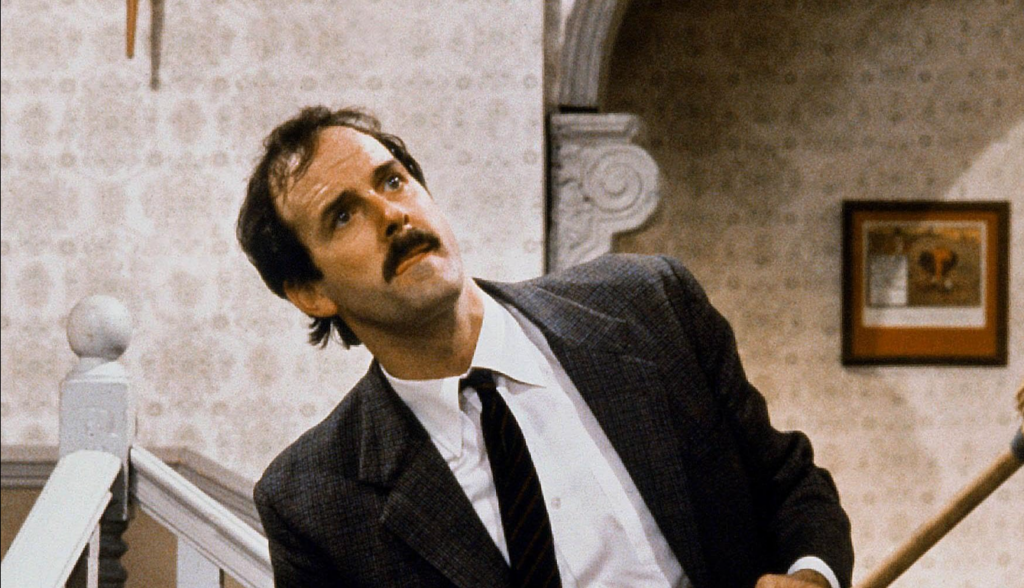
The show thrives on pushing its characters between rooms, introducing escalating problems, and culminating in explosive arguments or spectacular failures.
“The Psychiatrist” masterfully exemplifies this pacing, delivering a relentless barrage of unfortunate events that unfold one after the other, creating a sense of escalating chaos that keeps viewers on edge throughout the episode.
It’s a must-watch, where the worst-case scenarios just keep piling up, compelling you to watch in both amusement and disbelief.
Its meticulous construction isn’t limited to how it builds up to its jokes; “The Psychiatrist” is also ingeniously crafted from a technical standpoint.
The first act of the episode serves as an exemplary case study in pacing, a lesson in a comedy textbook on how to maintain tension and humor. The action remains exclusively at the front desk of the hotel for nearly ten minutes.
While Basil and Sybil alternate managing the front desk, a constant stream of guests enters and exits, yet the episode never shifts its focus upstairs, to the kitchen, or even to the office located just next door.
This deliberate approach stands out in an era where sitcoms often rapidly switch between scenes and locations to sustain momentum.
*It’s worth noting that this episode is longer than most Fawlty Towers episodes, running a full 36 minutes without commercials—a luxury rarely afforded to contemporary network comedies.
The constant flow of guests provides a stark contrast between the two ways Basil interacts with them, once again highlighting his lack of middle ground. As Sybil keenly observes, “You’re either crawling all over them, licking their boots, or spitting poison at them like some benzedrine puff adder.”
Mr. Johnson, an arrogant lothario in leather pants adorned with gold chains, is the unfortunate recipient of Basil’s poison. Sybil is more than willing to cozy up to Mr. Johnson and divulge intimate details about her mother while he’s on the phone.
This extended scene marks one of the rare moments where Prunella Scales has significant screen time without the presence of other hotel staff, and it provides insight into what Basil has learned to tolerate over the years, much to Mr. Johnson’s growing irritation.
On the other hand, the Abbotts, a vacationing couple who reveal themselves to be doctors, receive Basil’s boot-licking treatment.
Due to Basil’s sexist assumptions, he initially believes that the husband is both doctors, prompting him to inquire, “Did you take the test twice?”
Basil’s admiration for the Abbotts takes a sharp turn when he discovers that Dr. Abbott is a psychiatrist, which terrifies him due to his fear of potential insights into his mind and the profession’s tendency to link everything to sex, at least in his interpretation.
This fear becomes evident when the Abbotts inquire about how often he and Sybil go on vacation. His preoccupation with this notion doesn’t help when he encounters yet another new guest, an attractive Australian woman named Raylene.
Basil attempts to engage in the same look-but-don’t-touch admiration that Sybil often indulges in but ends up coming across as a creep.
He awkwardly compliments Raylene’s necklace and, to make matters worse finds his hands in an inappropriate place when attempting to repair her light switch.
The state of the Fawlty marriage is such that Sybil doesn’t even view this as a threat but rather as one of Basil’s usual fumbling attempts, quipping, “If you’re going to grope a girl, be good enough to be in the same room as her.”
Both of these scenes epitomize classic Fawlty Towers misunderstandings, but when night falls, the pace and intensity ramp up significantly.
Mr. Johnson has invited a girl he met in town to his room, blatantly defying Basil’s strict rule against guests having overnight company. This sets off a chain reaction of comedic chaos on the second floor of the hotel.
As previously mentioned, Bob Spiers took over as the director for the full series, and like his predecessor, John Howard Davies, Spiers skillfully utilizes the interconnected hotel set to its fullest potential.
The layout of all three hotel rooms—the Abbotts, Johnson, and his companion Raylene—is like a perfectly arranged row of dominoes. A gentle tap on one piece creates a chain reaction, with everything falling into place.
The physical comedy that unfolds is nothing short of spectacular, with Basil careening from one door to another, bouncing off walls, and even climbing outside the Abbotts’ window, all while maintaining the pretense of ensuring everything remains level.
The episode culminates in a series of physical beatings for Basil: first, when the ladder he’s using to spy outside falls, and then when Sybil confronts him, delivering three resounding slaps for his obsessive behaviour towards a female guest.
What makes this moment truly hilarious is Basil’s utter and complete bewilderment. He genuinely believes that he’s doing the right thing and can’t comprehend why Sybil doesn’t share his perspective—until Manuel clarifies what he told Sybil.
This is one of those classic moments in the show where a sense of impending doom slowly dawns on Basil as the truth comes to light.
His initial confusion gradually morphs into seething rage, and poor Manuel remains blissfully oblivious to it all, right up to the moment when Basil forcefully drives him into the ground.
This, of course, leads to yet another appearance by Dr. Abbott, and Basil is forced to offer yet another explanation, compounding the comedic chaos.
As the night unfolds, Basil’s mission to uncover the mystery girl becomes increasingly personal. He’s now driven to vindicate himself in the eyes of Sybil and the universe. First, he attempts to explain the situation to Sybil, who remains utterly unimpressed.
Then, he once again makes a fool of himself in front of the doctors, leaving them less than impressed. (“There’s enough material there for an entire conference,” Dr. Abbott dryly remarks to his wife in a colossal understatement.)
Desperate to hide, Basil retreats back into the closet, only to accidentally get his hand covered in black paint that had spilled. And to make matters worse, he hears someone approaching down the hallway.
At this point in the episode, it’s clear where the comedy is headed, but it’s the relentless escalation and the way they pile one problem on top of another that makes it so masterfully executed and simultaneously difficult to watch.
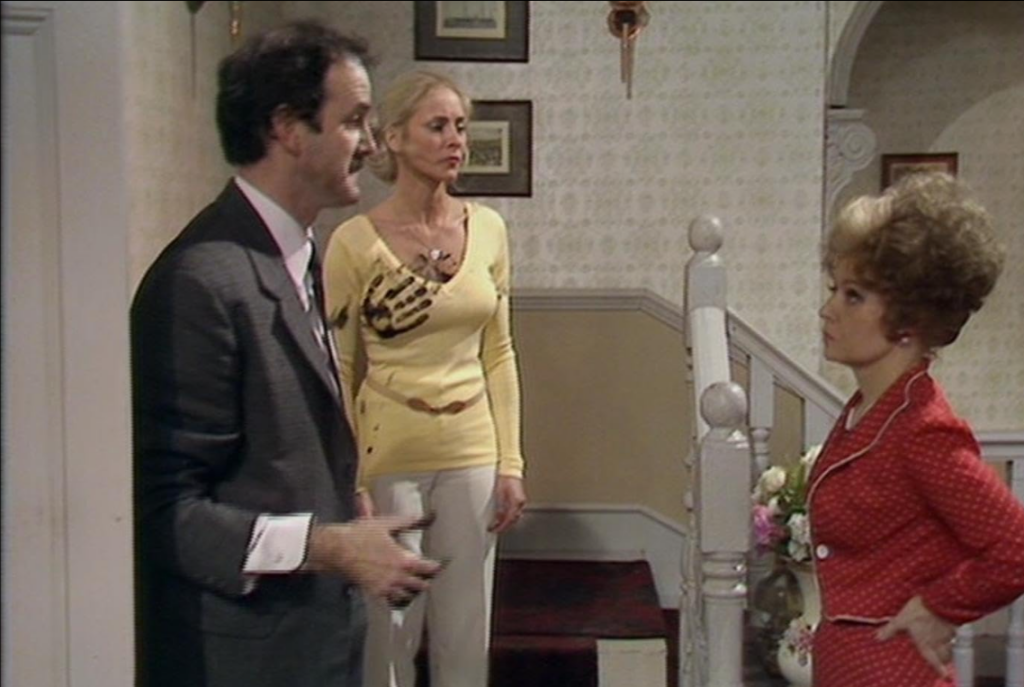
It’s almost a given that Basil will spring out and catch the wrong person, that his hand will accidentally land on Raylene’s breast again, and that Sybil will walk out of her room at precisely that moment.
To add to the hilarity, the hand that accidentally touched Raylene was the one coated in black paint.
What’s even more brilliant is that, even after this mortifying moment, Basil can’t let go of his determination to uncover the truth.
He rushes back into Raylene’s room to eavesdrop on Johnson’s guest one more time, only to be caught by Sybil again—this time in the closet. And amusingly, he still maintains his pretense of checking the doors.
Understandably, Sybil has completely run out of patience with her husband. Even by Basil’s standards, his actions reek of craven desperation, and she tears into him with unbridled gusto.
As the sleep-deprived and desperate Basil reaches his breaking point, he finally snaps and yells, “Shut up!” This moment is a testament to the power of multicam sitcoms, as you can practically hear the live studio audience collectively inhale in fear and anticipation once he utters those words.
Prunella Scales deserves accolades for delivering her response with icy precision: “Oh, you’ve done it now.” Likewise, Cleese’s performance in the ensuing tirade, which serves as a release of years’ worth of perceived insults, is deserving of acclaim:
“No, I haven’t, I’m just going to. I’m fed up with you, you rancorous, coiffured old sow! Why don’t you syringe the donuts out of your ear and get some sense into the dormant organ you keep hidden in that rat’s maze of yours?”
Tired of sneaking around, Basil heads to Johnson’s door and confronts him directly about the woman in his room. Johnson admits there’s a woman in his room, but to Basil’s surprise, it’s not the same woman he was searching for.
As it turns out, Johnson’s mother has arrived, a detail mentioned earlier in the lobby scene, and she happened to check in during the chaotic events that unfolded.
This seemingly throwaway detail becomes a crucial plot point, and as Basil’s tirade continues, you can’t help but wish for Mrs. Johnson to come out and end his misery.
To his credit, Basil manages to maintain a British stiff upper lip as he welcomes Mrs. Johnson to the hotel, only to lose his composure and start hopping around in the middle of the hallway once he’s left alone.
Will the passing Drs. Abbott finally takes pity on this man, who is clearly experiencing a nervous breakdown, by offering some therapy, tranquilizers, or perhaps even a straightjacket. Unfortunately, no.
They are on vacation, something which Basil clearly, deeply, and desperately needs.


